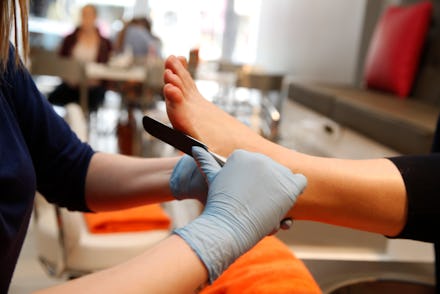Governor Cuomo Introduces Emergency Regulation to Protect Exploited Nail Salon Workers

After the New York Times' exposé Thursday on the disturbing and exploitative underbelly of the nail salon industry and how it treats its employees, New York Gov. Andrew Cuomo has introduced emergency regulation to protect the industry's workers.
"Effective immediately, he said in a statement, a new, multiagency task force will conduct salon-by-salon investigations, institute new rules that salons must follow to protect manicurists from the potentially dangerous chemicals found in nail products, and begin a six-language education campaign to inform them of their rights," reported the New York Times on Monday. "Nail salons that do not comply with orders to pay workers back wages, or are unlicensed, will be shut down."
The investigative piece that led to these measures documented poor immigrants being forced to pay $100 by nail salons for a job and not being paid for months until the owner deemed them skilled enough, all while working 12-hour shifts, having tips taken away and even facing physical abuse. Some of the nail salon workers report being kicked for sitting, charged for water and paid $1.50 per hour, if at all.
Nailed it? If Cuomo's forthcoming regulations are actually enforced and followed, the New York Times' investigative piece could potentially put an end to entrenched human rights abuses.
The problem is particularly bad in Manhattan, where the average cost of a manicure, at $10.50, is almost half that of the rest of the country. These low prices generally mean cutting costs within the business, a burden that all too often falls on undocumented immigrants' cut wages.
While the violations are of course illegal, the industry also offers uncomfortable social commentary on what consumers are willing to buy. The more cost-effective delivering manicures and pedicures are, the more ubiquitous the practice becomes and the more it is incorporated into weekly pruning rituals. This is perhaps what has encouraged people to keep their heads in the sand when it comes to these exploitative practices.
"The juxtapositions in nail salon workers' lives can be jarring," notes the New York Times. "Many spend their days holding hands with women of unimaginable affluence, at salons on Madison Avenue and in Greenwich, Connecticut. Away from the manicure tables, they crash in flophouses packed with bunk beds, or in fetid apartments shared by as many as a dozen strangers."
Transparency leads to accountability. Investigative journalism has been particularly instrumental in holding industry to account when it comes to human rights abuses. An article on slavery in the New Zealand fishing industry changed fishery and labor laws to protect workers and prompted complicit (perhaps unknowingly) companies like Whole Foods to examine their supply chains, in a similar vein to New York state's response to the New York Times piece.
Whatever the method, finding a way to give a voice to the voiceless is one of the most powerful and effective ways to end exploitation.
Nail salon employees now must wait and see how seriously enforced these measures are, but if the article truly leads to a radical change in workers' rights, it may end up transforming the lives of thousands of immigrants.